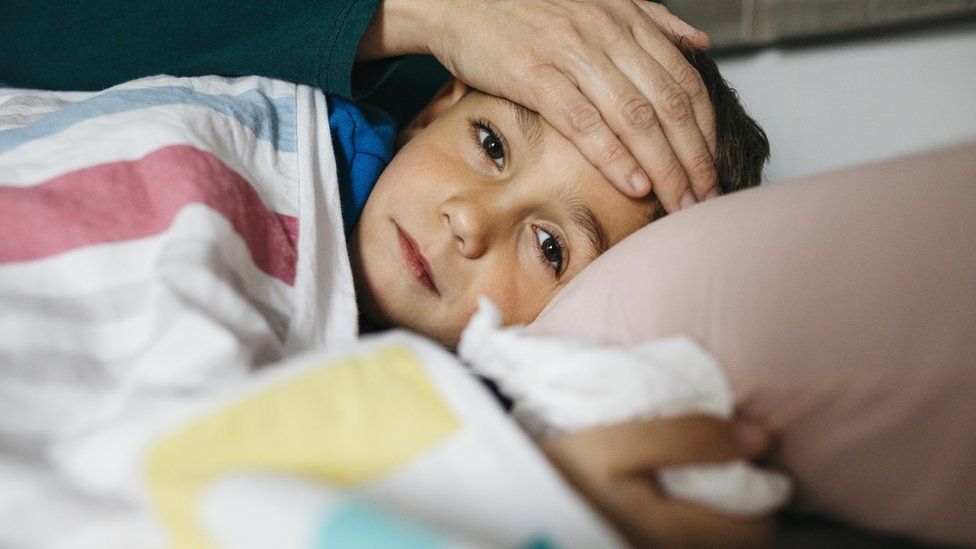What is strep A and what are the symptoms?
- Published

Health officials say parents should be aware of an infection called strep A, after children in the UK died from it.
Since Covid restrictions eased, there are more opportunities for infections like this to spread. Cases have been increasing in recent weeks.
While most people do not get extremely sick, the highly contagious bacterium that causes the infection can cause serious illness and complications.
What is strep A?
It's sometimes found in the throat or on the skin.
Many people carry it harmlessly without even knowing, but they can spread it to others who might become ill.
How do you catch strep A?
People can catch it through close contact and from coughs and sneezes.
Outbreaks can sometimes happen in places like schools and care homes.
What are the symptoms of strep A?
Most often, symptoms are mild - a sore throat or a skin infection that can be easily treated with antibiotics.
But strep A can cause a range of things - and some of them are more serious.
One is scarlet fever, which mostly affects young children and, again, needs antibiotics.
What is scarlet fever?
It is a notifiable disease, meaning health professionals must inform local health protection teams of suspected cases. This is so they can be treated quickly and possible outbreaks brought under control.
It causes a rash and flu-like symptoms, including a temperature, sore throat and swollen neck glands.
On darker skin the rash can be more difficult to detect visually but will have a sandpapery feel.
Someone who has scarlet fever may have what doctors call a strawberry tongue - because its appearance looks a bit like a strawberry.
Is strep A dangerous?
Very rarely, strep A can also cause something called invasive group A streptococcal infection or iGAS.
This can be deadly.
Invasive disease happens when the bacteria get past your body's immune defences. This can happen when you are already ill or are on treatments, such as some cancer therapies, that affect your immune system.
Warning signs of invasive disease include:
- fever (a high temperature above 38C)
- severe muscle aches
Urgent, early medical help is essential.
The UK Health Security Agency advises: "Anyone with high fever, severe muscle aches, pain in one area of the body and unexplained vomiting or diarrhoea should call NHS 111 and seek medical help immediately."
What to do if your child is unwell
If you think your child may have any symptoms from strep A then you should speak with your doctor.
Tell them if you have been in contact with someone who has had strep A recently.
Trust your judgement if your child seems seriously unwell.
Contact NHS 111 or your local surgery if they:
- are getting worse
- are eating much less than normal
- show signs of dehydration, such as a dry nappy for 12 hours
- have a temperature of 39C or higher, or 38C if under three months old
- are a baby and feel hotter than usual when you touch their back or chest or sweaty
- are very tired or irritable
Call 999 or go to an accident-and-emergency unit if:
- they are having difficulty breathing - you may notice grunting noises or their stomach sucking under their ribs
- they are pausing when they breathe
- their skin, tongue or lips are blue
- they are floppy and will not wake up or stay awake
Does strep A affect adults?
Yes. Anyone can catch it if they come into close contact with someone who is infected. Most people will not get very sick though.
Is there a vaccine for strep A?
No. Strep A is treated with antibiotics.
Is there a swab test for it?
Doctors usually diagnose and treat strep A infections based on a person's symptoms, rather than test results, but they may take a throat swab. In the UK, rapid turnaround swab tests are not used by the NHS. Prof Kamila Hawthorne, chair of the Royal College of GPs, told the BBC: "We are not advising using those at the moment. It's very much a clinical diagnosis."
For example, someone who tests positive for strep throat but has no symptoms may not need antibiotics. They are less likely to spread it to others than someone with symptoms, and they very unlikely to get complications.
How long does strep A last?
People with strep throat should stay home from work, school, or nursery until they no longer have a fever and have taken antibiotics for at least 24 hours. This will help stop the infection spreading to other people.
What is the UK doing about it?
Investigations are under way following reports of an increase in infections in children over the past few weeks, particularly with some causing severe illness.
Currently, there is no evidence that a new strain is circulating. The increase is most likely related to high amounts of circulating bacteria.
Have you and your family been affected by strep A? Share your experiences by emailing haveyoursay@bbc.co.uk.
Please include a contact number if you are willing to speak to a BBC journalist. You can also get in touch in the following ways:
- WhatsApp: +44 7756 165803
- Tweet: @BBC_HaveYourSay
- Upload pictures or video
- Please read our terms & conditions and privacy policy
If you are reading this page and can't see the form you will need to visit the mobile version of the BBC website to submit your question or comment or you can email us at HaveYourSay@bbc.co.uk. Please include your name, age and location with any submission.
Related Topics
- Published2 December 2022
- Published1 December 2022